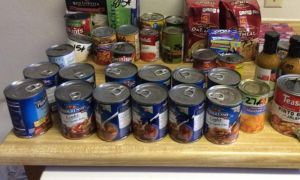
Did you know that food makes up the biggest percentage of material deposited into landfills each year?
So much food gets discarded that according to the FDA, “food waste is estimated at being between 30–40 percent of the food supply.” Almost one-third of our global food supply is wasted each year.
Now, the purpose of this article is not to make folks feel bad about wasting food. However, if a food crisis or emergency hits, people won’t be tossing out as much food as before.
It will be important to know which foods you can safely consume past their expiration date, and which ones are a little more risky or should be thrown away.
In this article, we’ll discuss the different types of expiration dates on food products, a few examples of expired foods you can safely eat when SHTF, and how to tell if food is safe to eat after its expiration date.
Disclaimer:
While eating “expired” food probably doesn’t seem like the soundest advice, many so-called “expired” foods are actually perfectly safe to eat. According to the FDA:
“Manufacturers provide dating […on food packaging…] to help consumers and retailers decide when food is of best quality. Except for infant formula, dates are not an indicator of the product’s safety and are not required by Federal law.” (Source)
When consuming food that is “expired” or past its recommended date, please rely on your own best judgment. Always inspect food for noticeable changes in color, smell, and consistency before eating.
What Do The Dates On Your Food Really Mean?
Expiration dates on food are confusing. Most people believe that there’s a scientific explanation for the printed dates on their food. However, that’s not always exactly the case.
? What Happens When You Take Expired Medications
As it turns out, predicting when food will still be “safe” to eat isn’t really an exact science because quality and freshness can depend on several factors.
Things like food quality, storage, and handling can affect the total shelf life. Knowing this, what exactly do all the different expiration dates mean?
“Use-by” :
“Use-by” dates are essentially a recommendation of “freshness”. It indicates when a product should be consumed to enjoy it at its tastiest. According to the manufacturer, the date printed on the label is the last day that the product is likely to maintain its “peak quality”.
Properly-stored food items have the potential to last for months to years beyond the printed date. (Infant formula is the only exception to this rule, which is the only food that has a federally regulated expiration “use-by” date.)
“Best-by” or “Best if Used by”:
“Best-by” dates are basically the same thing as “Use-by” or “Best if Used by” dates. So, if you eat food past this date, you’re more likely to run into quality issues than safety issues. If stored properly, these foods are typically safe to eat well past their “Best-by” date.
“Expires-on”:
“The “expiration” date is the last day the food is technically considered “fresh”. After that date, the chances of your food going rancid, or sour are likely to rise.
Food that is past its expiration date can still be eaten if you determine it as being safe to eat. However, if it has a sour smell, an off-color, a funky texture, or separating liquids, you’re probably better off throwing it away.
“Sell-by”:
The sell-by date is usually placed on food for inventory purposes. It tells the store how long to sell the food before removing it from shelves.
Food that has passed its “sell-by” date can be trickier to determine whether or not it’s safe to eat. So, it’s up to you to decide if it’s still “good” before eating.
Expired Foods That Are Generally Safe To Consume
Canned Foods
When it comes to eating expired foods, canned items are likely to be your best bet in the long term.
This is because canned foods are pressurized and sealed using temperatures hot enough to kill most pathogens.
For this reason, the chances of contamination or spoilage are minimal if cans are handled and stored properly.
Related: 7 Mistakes You Are Making When Buying Canned Foods
In fact, there have been reports of people eating canned food as old as 100 years with no negative effects. However, when it comes to eating canned food that’s well-passed its expiration date, storage, and quality of ingredients are everything.
When to avoid “expired” canned food:
If cans of food have deep dents, are swelling, or have rust on them, it’s probably better to reject them unless you’re in a true “do-or-die” situation. Even then, always inspect the expired food before consuming it to determine for yourself whether or not it’s still safe to eat.
Additionally, some canned foods are more acidic and may “eat away” at the can’s inner lining over time. This can lead to food spoiling faster once the expiration date passes.
For this reason, preppers often keep a variety of low and high-acid canned foods in their stockpile. Always inspect the quality of the can and its contents before eating highly acidic expired canned food.
Dried/Powdered foods
If storage conditions are right, unopened dried foods such as flour, powdered milk, salt, powdered peanut butter, sugar, dried spices, and powdered spices, etc., might still be perfectly safe to eat after their “expiration” date.
Related: How To Make A Meat Powder That Can Last 5 Years
Because of their ultra-low moisture content, they’re less susceptible to bacterial growth and can be kept in a cool, dry place for months to years after expiration.
It’s important to note that some dried and powdered foods that are “activated” like yeast, baking powder, and baking soda can become “inactive” or deteriorate in quality after the expiration date, especially once opened.
They can still be used after “expiring” – they just might not work as well. Unopened containers can be stored in the pantry or freezer for 2-3 years before quality is affected.
When to avoid “expired” dried foods:
Dried dairy products with low fat have the potential to last longer than products that don’t. So, full-fat powdered butter, peanut butter, or milk will start to go bad more quickly than non-fat-dried products.
Additionally, dried foods with already higher moisture or nutrient content, like brown sugar, whole wheat flours, and brown rice, may lose their nutritional density faster, but should still be just fine to eat if properly sealed and stored in a cool, dry place.
If dried dairy foods have signs of moisture, contamination, or other observable damage, consume them at your own risk.
Nuts
Properly stored nuts can last for quite some time after the expiration date.
Nuts of all varieties that are stored in a sealed, airtight container can be eaten up to 2-years beyond the printed date, in most cases. Some brave people have reported eating “expired” nuts that were even older than that!
As long as your nuts don’t show signs of spoilage or rancidity, you should be okay to eat them.
However, some sensitive individuals report minor stomach upset or temporary digestion problems from eating expired nuts. As with everything else on this list, consume expired nuts at your own risk.
When to avoid “expired” nuts:
Nuts tend to be high in fat which goes rancid over time. Before eating nuts past their expiration date, check for rancidity first.
If there are any signs of oiliness, excess moisture, or you notice a chemical or paint-like smell, you may want to consider eating a different food item if possible.
Bread
As far as wheat based products go, crackers, cookies, and tortilla chips can all stretch well beyond their printed date if stored correctly. Bread, on the other hand, has a pretty limited shelf life, especially if you make it at home.
Related: How To Make Bread Last For Up To 5 Years
Although bread may not be the best food item to keep in your stockpile long-term, you never know when stuff will “hit the fan” or when you’ll want to stretch your loaf of bread for longer than you originally needed to.
In this scenario, bread can last longer than you’d guess – About 1-2 weeks beyond the printed date for store-bought bread and 5-7 days for bread baked at home.
When to avoid “expired” bread:
Bread, even stale bread, can still be relatively safe to eat until it shows sign of mold or rancidity. Some folks simply cut off the moldy outside parts with a knife and eat the rest, like one might do with hard cheese.
However, the mold you see on the outside of bread could also be on the inside, so take caution when eating bread past its expiration date.
Eating less-than-perfect bread is something our ancestors likely did when times were rough. In modern times, old bread makes the best french toast, meatloaf, or bread pudding! Ultimately, the decision to eat expired foods is yours to make.
It’s important to note that there are many types of molds and fungi that can grow on moist foods like bread. Some molds and fungi are more dangerous than others and can sometimes cause symptoms like nausea, headaches, allergies, or other health problems.
Root Veggies
Root vegetables are a great and nutritious food to have on hand. This is likely owed to how long they can stay fresh given the right conditions.
Potatoes, beets, radishes, and other root veggies or tubers can be kept in a cool, dark place for several weeks unrefrigerated before they start to sprout.
The best way to store them is in a root cellar. If you don’t have one, here is a cheap and easy way to build a root cellar in your backyard.
When to avoid “expired” root veggies:
Unfortunately, these veggies don’t always look the prettiest on the outside. As a result, they tend to get tossed out pretty often even when they’re still fine to eat.
If your root veggies have large “mushy” spots, are leaking strange liquids, or smell “off”, by all means, throw them away!
However, if the root vegetable is still firm – but there are a few darker-hued dents, bruises, sprouts, or warts on the skin of your potatoes or beets – it’s probably still good to eat.
Simply skin away these parts with a potato peeler or knife, just like one might do with hard cheeses or loaves of bread. As long as it passes your quality check and you’ve determined it as being safe to eat, you’re probably safe to proceed.
Honey, Molasses, And Syrups
When honey is sold in stores, it usually has a “Use By” date on the label.
But the thing about honey is that it never really expires.
Because of its low moisture content, there’s not a lot of room for microbial or bacterial growth.
Unless you expose the honey to moisture or some other contamination, honey has an almost limitless shelf life.
The same can be said for man-made sugary syrups like most types of maple syrup, pancake syrup, Karo syrup, or simple syrup. These food items have so much sugar in them that it keeps the contents more or less preserved indefinitely.
Well-kept syrups can last anywhere from months to years longer than what it says on the printed use-by or expiration date. You might notice changes like a darkening in color or crystallization overtime, but this is considered normal and still safe to consume in most cases.
When to avoid “expired” syrups:
Although sugar is responsible for giving syrups their longer shelf-lives, it is important to note that the quality of these products can decline over time once opened.
Since moisture and other contaminates can quickly compromise the quality of your syrups, store in a cool dry place with an air tight cap once opened.
Overtime, you may notice changes in color, consistency, and taste. Eventually, this can affect the overall quality of the product but that doesn’t seem to make people sick or deter people from using it.
However, if your syrup or honey smells foul or sour, it might have started fermenting. If this happens, you’ll want to throw it away!
Eating expired food might sound like an extreme measure, but it can be a lifesaver in certain situations. In a SHTF situation for example, expired food can provide much-needed energy and nutrition when other food sources are not available.
However, it is important to remember that expired food may not be as nutritious or safe as fresh food and should only be consumed if absolutely necessary.
With proper knowledge about how expiration dates work and what warning signs to look for, eating expired food can help you survive in the most difficult circumstances.
You may also like:
These 10 Types of People Will Die First When SHTF
How To Get 295 Pounds Of Extra Food For Just $5 A Week (Video)
11 Expensive Items That Used To Be Cheap
How To Build An Electricity Free Fridge
What They Should Teach You In College About Government



